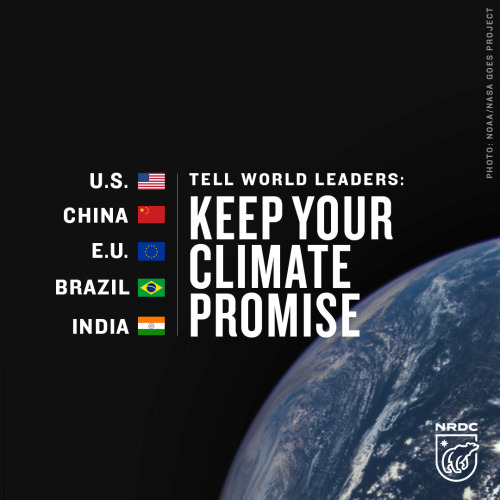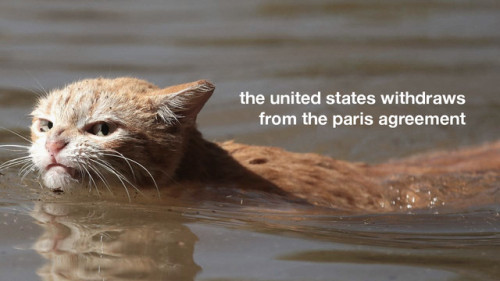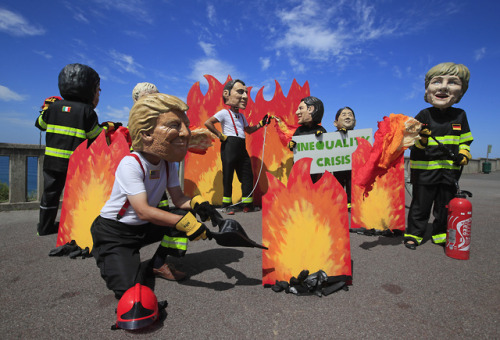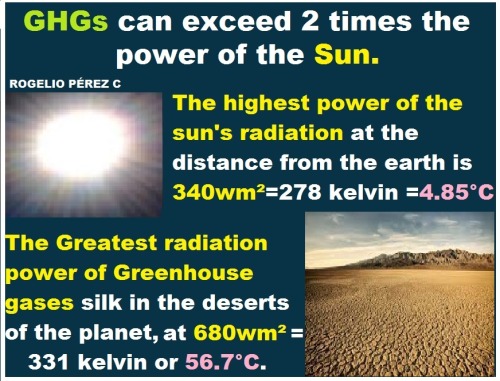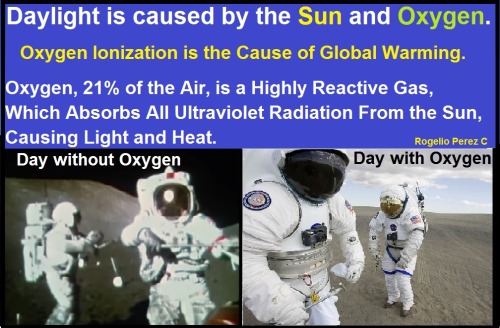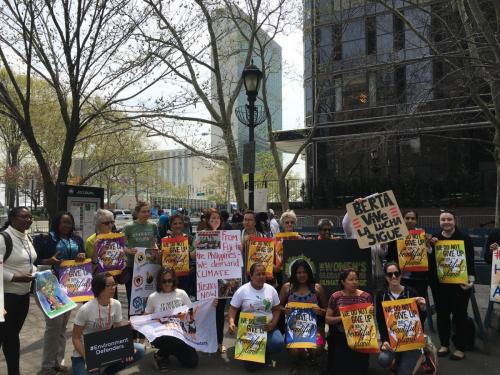#paris agreement
In a recent paper published in Nature Climate Change, an international group of researchers are urging countries to reconsider their strategy to remove CO2 from the atmosphere. While countries signed up to the Paris Agreement have individual quotas to meet in terms of emissions reduction, they argue this cannot be achieved without global cooperation to ensure enough CO2 is removed in a fair and equitable way.

Harmful emissions
The team of international researchers from Imperial College London, the University of Girona, ETH Zürich and the University of Cambridge, have stated that countries with greater capacity to remove CO2 should be more proactive in helping those that cannot meet their quotas.
Co-author Dr Niall Mac Dowell, from the Centre for Environmental Policy and the Centre for Process Systems Engineering at Imperial, said, ‘It is imperative that nations have these conversations now, to determine how quotas could be allocated fairly and how countries could meet those quotas via cross-border cooperation.’
The team’s modelling and research has shown that while the removal quotas vary significantly, only a handful of countries will have the capacity to meet them using their own resources.

Reforestation
A few ways to achieve carbon dioxide removal:
(1) Reforestation
(2) Carbon Capture and Storage (CCS)
(3) CCS coupled to bioenergy – growing crops to burn for fuel. The crops remove CO2 from the atmosphere, and the CCS captures any CO2 from the power station before its release.
However, deploying these removal strategies will vary depending on the capabilities of different countries. The team have therefore suggested a system of trading quotas. For example, due to the favourable geological formations in the UK’s North Sea, the UK has space for CCS, and therefore, they could sell some of its capacity to other countries.

Global cooperation
Co-lead author Dr Carlos Pozo from the University of Girona, concluded; ‘By 2050, the world needs to be carbon neutral - taking out of the atmosphere as much CO2 as it puts in. To this end, a CO2 removal industry needs to be rapidly scaled up, and that begins now, with countries looking at their responsibilities and their capacity to meet any quotas.’

Today is the day to celebrate our beautiful planet, and to emphasize how important it is to care for it.
Today, a record number of countries are meeting in New York City to sign the historic Paris Agreement on climate change!
Aswe are witnessing the slow dying of the biggest living entity on our planet, the Great Barrier Reef, it is time to take action.
- 10 things you can do to save the oceans-this includes reducing your carbon footprint, using less plastic, make sustainable seafood choices, and spread the word!
- The lazy person’s guide to saving the world -Things you can do from your couch, at home, or outside your house!
And to end on a positive note, here is a piece on why we are not as doomed as we think.
Let’s start looking after our planet.
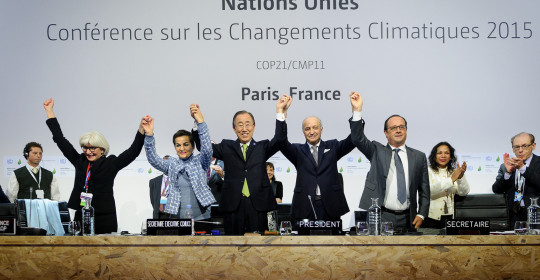
- What does the Paris Agreement do?
Remember this just a kind of a “draft” of a fuller deal that will be adopted by 2020. It basically creates a binding process by which countries individually pledge to change course from “business as usual” on greenhouse gases and deforestation. I won’t get into too much details, as I found the infographic posted below that summarizes the key points pretty well, and a lot of other media outlets have covered it.
This deal firmly suggests that all countries cut down their emissions to limit GW to 2C above pre-industrial levels. But we all know that we are already on track to go past that based on the emissions that have already been emitted. So what’s the point of that language if it’s too late? Well, if we have that as a goal, at least countries can shame one another in bilateral negotiations or peer-pressure each other into reaching that target.
This agreement finally acknowledges that we can’t solve this the way we thought we could. This was the first time that there was so much diplomacy and commitment to basic science and development, with countries finally admitting that well… they don’t know how to fix this, and that they need to all work together. I think the sole fact that 195 countries AGREED on something is mind-blowing and that in itself is a success.
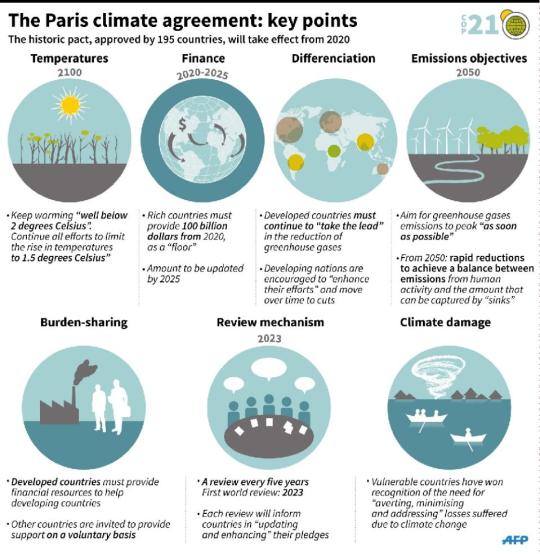
(Source: Agence France Press)
- Why is the language so vague when it comes to GHG emissions?
One of the biggest complaints was that the deal doesn’t really give a number to aim for to reduce GHG emissions. It just says to pretty much make a change “as soon as possible.”
The main reasons this Agreement isn’t legally binding and doesn’t give us that number we were all looking for is because of the climate deniers within the Republican party. The US contingent got everyone to agree to change the word “shall” to “should” in the text. If “shall” had remained and thus required accountability, it would have had to go through Congress and realistically, would have gotten killed there by the Republicans. These climate deniers do yield a disproportionate influence over global and international climate change policy.
Many European heads of delegations present in Paris fully admitted that the reason why rich countries aren’t required cuts to emissions is literally because of Congress, the Senate and the Republican party. The specter of the Republican party was all over these talks, and reaches way beyond the American borders.
- Climate change coverage in the USA
I was really disappointed by the lack of media coverage of the COP21 here in the United States. Many media outlets brush climate change to the side because it doesn’t have this “immediate” threat that other issues present and many view it as a boring topic, but it is so short-sighted to ignore climate change altogether.
Climate change is such a touchy issue in the USA. There is such amessed up debate in this country with one half of the conversation trying to cope with reality, and the other side with its head buried in the sand and pretending nothing is wrong. I mean come on! California is essentially out of water, the Northeast faced its harshest winter ever last year while this year it was in the mid 60s on Christmas day, there have been terrible floods in the South, we just had the strongest hurricane ever recorded, and South Florida is slowly going underwater every time there is a high tide because of sea level rise.

Climate change will affect (and is already affecting) the economies of the world, geopolitical strategies, and will likely engender wars over water and resources in the future. Themigrant crisis will only become more exacerbated as our planet warms up. Nevertheless, as long as people don’t see it as a direct threat to national security, I am afraid it still won’t get the attention it needs. We don’t have anymore time to debate on people’s opinions of climate change and ask whether they believe it or not. It’s a scientific fact, it’s already happening.
I think that if we want something big to happen to fight climate change and for politicians to actually do something, it will have to come from us, from grassroots organizations and NGOs. It will have to come from us pressuring the people we elected to make changes and to listen to our voices. This video was done before the COP21, but this segment at the end pretty much sums it up:
This is what Earth Day is all about! We’re fighting climate change today, to secure a safe environment for future generations. Today at the UN, the U.S. and 174 other countries signed the historic Paris Agreement.
Thank you, Secretary John Kerry for signing on our behalf. And thank you President Obama for helping make this happen!
GIF via Lorey.
This Friday is Earth Day, and it will be historic: World leaders will meet at the United Nations in New York to sign the historic Paris climate agreement they struck last December. The signing will officially put the world’s blueprint for a clean energy future into motion.
But now, we must turn the promise of Paris into the concrete steps we need to protect our world. That’s why we’re looking to the world’s five largest emitters of carbon pollution — the U.S., the European Union, China, India and Brazil — to steer this new era in our fight against climate chaos.
You can help! Take action by signing our petition and asking the “Big 5″ carbon polluting countries to deliver on their Paris climate commitments. Click here to learn more and add your name!
Post link
It’s official! Joe Biden just signed the executive order that will bring the United States of America back in the Paris Climate Agreement.
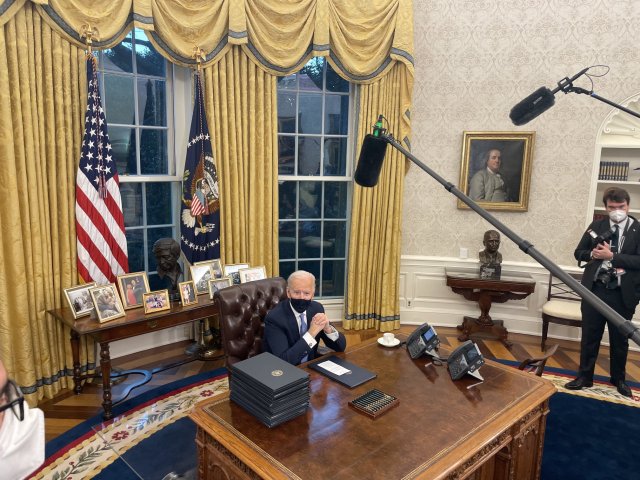
Author of the photo: @ZekeJMiller on Twitter
(Photo: Peter Dejong/AP)
Burn, baby, burn
Fossil fuels have had large societal benefits and indeed represent a great wealth in the ground. But for both people and planets, wealth without health is a losing proposition. Our view.Opposing view.
Post link
The Greenhouse Effect is a Hoax
Explain that the GHG that Absorbing Radiation From the Earth of 240wm² = 255 Kelvin or -18°C,
In 1913 it reached its maximum power of 680wm² = 56.7°C, exceeding twice the power of the Sun of 340wm².
Post link
The Greenhouse Effect is a Hoax
It explains that ghgs retain temperature of -18°C and re-emit it in all directions at 14°C. an increase of 33°C
the temperature in the atmosphere originates in the kinetic motion of all its molecules.
Post link
The Greenhouse Effect is a Hoax
It only take into account ghgs (0.04% of the air),to explain the heat, it overlooks 99.96%.
Phenomenon of ionization of oxygen (21% of the air) by ultraviolet light is overlooked,it causes light and heat.
Post link
Protecting the Climate, Protecting Human Rights
Policymakers are converging on Bonn, Germany this week to hammer out details so countries can begin implementing the Paris climate agreement. As they work, they would do well to remember the speeches given by government leaders at the April 22 signing ceremony at the United Nations.
Post link

